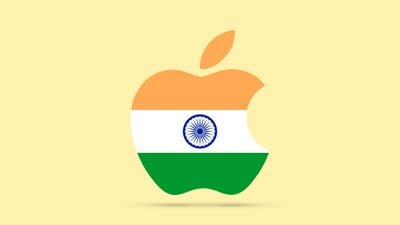India Plans Subsidies to Boost Apple's Production Efforts
India is set to implement a series of subsidies and tariff reductions designed to lower production costs for Apple and other smartphone manufacturers as part of its broader effort to become a global electronics manufacturing hub (via Bloomberg).

India is proposing $2.7 billion in financial incentives and tariff adjustments targeting the electronics sector, particularly benefiting smartphone makers such as Apple. The measures are intended to bolster the production of critical components like batteries, camera modules, and microprocessors, which are currently largely imported from countries such as China.
Prime Minister Narendra Modi's government previously rolled out several initiatives, including the Production-Linked Incentive (PLI) scheme, which drew major companies like Apple and Samsung to set up or expand their production facilities in India. The focus of the new proposal is more granular, specifically targeting the establishment of a domestic supply chain for components.
Apple has been steadily increasing its production footprint in India. The company began assembling iPhones in India in 2017, initially focusing on older models. More recently, Apple has ramped up its operations, with India-produced iPhones now accounting for roughly 15% of the company's global output. Notably, the iPhone 16 saw its production in India commence just weeks after its global launch.
The proposed subsidies could further accelerate Apple's plans to localize production, potentially enabling simultaneous launches and production of future models, such as the iPhone 17, in both India and China. A final decision on the measures is expected to be announced during the upcoming federal budget in February.
Popular Stories
Apple today shared an ad that shows how the upgraded Center Stage front camera on the latest iPhones improves the process of taking a group selfie.
"Watch how the new front facing camera on iPhone 17 Pro takes group selfies that automatically expand and rotate as more people come into frame," says Apple. While the ad is focused on the iPhone 17 Pro and iPhone 17 Pro Max, the regular iPhone...
In select U.S. states, residents can add their driver's license or state ID to the Apple Wallet app on the iPhone and Apple Watch, and then use it to display proof of identity or age at select airports and businesses, and in select apps.
The feature is currently available in 13 U.S. states and Puerto Rico, and it is expected to launch in at least seven more in the future.
To set up the...
Apple plans to announce the iPhone 17e on Thursday, February 19, according to Macwelt, the German equivalent of Macworld.
The report, citing industry sources, is available in English on Macworld.
Apple announced the iPhone 16e on Wednesday, February 19 last year, so the iPhone 17e would be unveiled exactly one year later if this rumor is accurate. It is quite uncommon for Apple to unveil...
In the iOS 26.4 update that's coming this spring, Apple will introduce a new version of Siri that's going to overhaul how we interact with the personal assistant and what it's able to do.
The iOS 26.4 version of Siri won't work like ChatGPT or Claude, but it will rely on large language models (LLMs) and has been updated from the ground up.
Upgraded Architecture
The next-generation...
New MacBook Pro models with the M5 Pro and M5 Max chips could arrive as soon as Monday, March 2, according to Bloomberg's Mark Gurman.
In today's "Power On" newsletter, Gurman said that the release of new MacBook Pro models is tied to the release of macOS Tahoe 26.3. The launch is said to be slated for as early as the week of March 2. He added that the M4 Pro and M4 Max models on sale today...



















